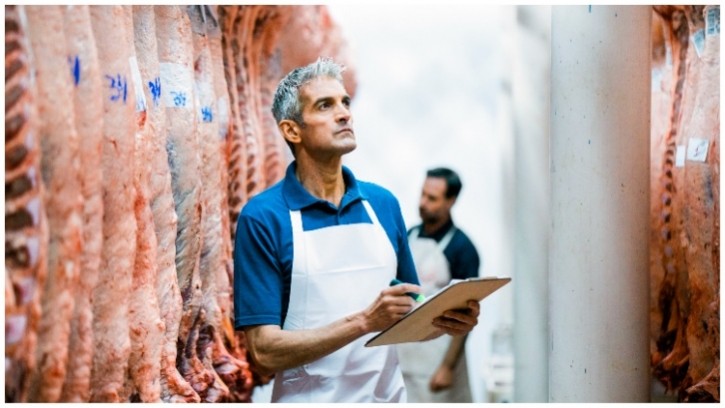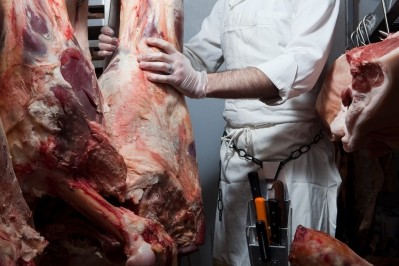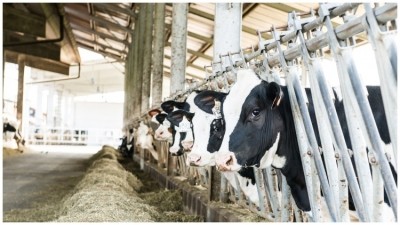Short read
Does meat inspection at small abattoirs need to change?

It’s no secret that the abattoir sector is struggling against financial headwinds, with the Food Standards Agency (FSA) revealing that the UK is losing small abattoirs at a rate of 10%.
From supermarket pressure on the local highs streets, production cost increases and the price of European inspection systems, many local, artisanal and remote facilities have been forced to close.
How many abattoirs are there in the UK?
Data from 2022 from the AHDB revealed that in England, there were 165 red meat abattoirs in 2019. This dropped to 159 in 2020 and 151 the following year. Between the types of abattoirs, the decline in cattle, sheep and pig abattoirs is fairly consistent. Overall, including poultry slaughterhouses in England and Wales, the FSA reports a fall from 248 in 2018 to 211 in 2022.
These closures are having a big impact, with many who previously relied on their local abattoir finding it difficult to get booked in, and as a result having to limit operations or even close their own businesses. It also means that many village communities are seeing more redundancies as businesses shut up shop; and on a wider scale, it’s causing the UK’s food miles to tick upwards.
“There is a clear need for a new approach” when it comes to supporting these premises, expressed AIMS’ (the Association of Independent Meat Suppliers) consultant, Dr Jason Aldiss in a report published earlier this year entitled ‘A Technological & Sustainable Approach to Meat Inspection Version 2, May 2023’.
Regulation for abattoir meat inspections
The report outlines the opportunity Britain now has following Brexit, which removes the need to fully implement and comply with all aspects of the Official Controls Regulations to help pull this threatened sector from “further diminution” and hopefully make it a more sustainable process too.
Currently, all abattoirs must adhere to the same set of regulations (in compliance with EU rules) regardless of size, and undergo an inspection regime that Dr Aldiss argues is more suited for larger, industrial exporting organisations.
As he explains: “This fact remains even if a business is not exporting their products and are only serving their local community. Many of these smaller artisanal operations deliver much higher standards of food safety and animal welfare than dictated by the Regulations based on the pride of the operator for his craft and the value he places on his customer and community.”
Yet, Dr Aldiss contends that through the use of technology, the UK Government has the opportunity to deploy a new kind of inspection protocol that would see significant savings to the Exchequer and the industry.
How meat inspections could be adapted for smaller abattoirs
Dr Aldiss offers an example of a provenance based and e-identification solution powered by blockchain in which livestock is still identified and recorded as usual but stored in this novel way to ensure secure, tamper proof traceability.
In this scenario, smaller abattoirs would be removed from the existing legislative framework and able to operate under a different regime, producing meat for domestic consumption only.
With regards to vet inspections, he suggests a remote alternative in which the use of high-tech thermo-imaging camera technology – further enhanced through the use of spectroscopic analysis – is implemented.
“Camera technology is relatively cheap and easy to install – it is a current legislative requirement in all slaughterhouses to have such technology throughout GB and it would be a simple step to extend the reach and remit of the existing systems,” he wrote.
He adds that there is also an opportunity for this to be automated using machine learning (ML) and artificial intelligence (AI), removing the need for a meat inspector who visually assesses the fitness and applies a health mark certifying the meat is safe.
“Appropriately ‘taught’ ML will permit this task to be completed remotely (a Proof of Concept (PoC) of an ML-based alternative to physical inspection is already underway).”
He continued: “In the interim prior to completion of the PoC industry-employed ‘spotters’ can be trained so that operatives carrying out dressing in a premises can then also do a check on the fitness of the meat – this can then be verified remotely. Such a plant-based operative inspection system has existed in the poultry sector for decades and an equivalent system is in operation in Australia and the evidence has shown in both cases to work extremely effectively.”
How is the UK Government supporting smaller abattoirs?
Responding to Dr Aldiss’ comments around the “one size fits all approach” to inspections, the FSA’s Richard Sharp, head of operational delivery, said: “We’re well aware of the vital role of small abattoirs in supporting their local food system and the challenging market pressures they face, which is why we have already provided a range of support, including substantial discounts, reducing paperwork and inspection flexibilities.
He added: “We need to balance the regulatory approach across the entire sector in a way that protects and maintains the UK’s high food and animal welfare standards, so we are working with Defra and the sector to support the long-term viability of the small abattoir network.”
Support from the FSA for smaller abattoirs has included:
- Taxpayer funded discounts so that the smallest abattoirs pay £5.39 an hour for a vet rather than £53.90
- Reducing the amount of paperwork for small producers through the introduction of more streamlined, ‘by-exception’ reporting requirements
- Being more flexible around inspection, such as taking representative sampling which means a sample of birds from the same flock can be inspected before slaughter, rather than every bird.
Meanwhile, DEFRA has committed to engaging with both the FSA and the small abattoir sector to address the complex issues the industry is facing. Earlier this year, farming minister Mark Spencer unveiled plans to introduce funding to promote innovation, enhance productivity and improve animal health and welfare in smaller abattoirs.
To this end, the department is chairing the Small Abattoirs Working Group (SAWG) which brings together representatives of DEFRA, FSA, the Rural Payments Agency and small abattoir representatives.
In early 2022, the SAWG was supplemented by the creation of a Small Abattoirs Task and Finish Group. This smaller group is co-chaired by DEFRA and the sector-led Abattoir Sector Group and is said to have more regular meetings wherein priority issues are identified and solutions discussed.
Working together with industry and FSA, this group has rolled out a number of new approaches that support smaller abattoirs, including the FSA’s reduced administration initiative which will be refreshed this year as an adopted practice.

















